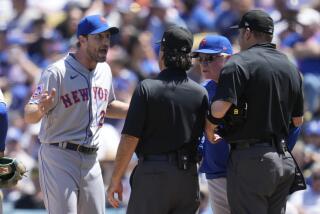Tarpley Out for Not Testing
Roy Tarpley of the Dallas Mavericks Wednesday became the seventh player to be kicked out of the NBA under terms of the league’s anti-drug agreement.
Tarpley, who averaged 12.6 points and 10.5 rebounds in his first five seasons in the NBA and was named sixth man of the year in 1988, received his so-called third strike for refusing to take a drug test after missing practices Sunday and Monday. He had traveled to Houston to meet with counselors at John Lucas’ drug and alcohol clinic Tuesday, though his attorney, Jay Ethington, said the visit had nothing to do with drugs.
NBA general counsel Gary Bettman said Tarpley denied “repeated attempts” by the league to have him take a drug test and became the first player suspended for that reason.
“His refusal to take the test speaks for itself,” Bettman said. “He knew it was strike three.”
Tarpley, who had no immediate comment after being informed of his suspension without pay, may apply for reinstatement in two years. Of the six previous players to be banned--John Drew, Lewis Lloyd, Micheal Ray Richardson, Duane Washington, Chris Washburn and Mitchell Wiggins--Lloyd, Richardson and Wiggins were reinstated.
Team owner Donald Carter said: “It’s stupid that somebody who has that kind of talent would let this happen.” But, he added, the Mavericks will keep the door open for a possible return.
Maverick officials have debated about Tarpley’s predicament for years--whether to gamble that he will one day straighten out and become a force or trade him and cut their losses. But with the additional baggage of a contract that calls for $8.45 million the next three seasons, they realized the chances for a deal were minute. The “Catch-22” was that they needed the 7-foot forward to become an All-Star to get something of worth in return.
Wednesday’s announcement brought the predictable condolences, but also a heavy sigh, the notion that at least teammates and staff won’t have to worry about Tarpley for at least two years.
Coach Richie Adubato termed it a “minor relief.”
Rick Sund, vice president of operations, acknowledged: “This was probably good for Roy and good for the team. It would have been a trying situation with him on the Mavericks this year.”
Tarpley was rarely more impressive than in the five games he played at the start of last season before suffering a knee injury. He averaged 20.4 points and 11 rebounds a game. Even his progress during rehabilitation from reconstructive surgery was encouraging for a complete return early in 1991-92, which made his March 30 arrest for driving while intoxicated all the more disappointing. Tarpley was found not guilty but acknowledged that he had three beers that evening.
He was suspended without pay as a result of that incident, judged to be a violation of his after-care program, but not a third strike. It was his second suspension, the first without pay having come after a 1989 DUI arrest.
So no one was surprised by the latest news. As veteran center James Donaldson told the Dallas Morning News late last season: “You have to wonder when the next slip-up will be. It could be next week, next month or next season. But it’s almost to a point where you know there will be another one.”
More to Read
Go beyond the scoreboard
Get the latest on L.A.'s teams in the daily Sports Report newsletter.
You may occasionally receive promotional content from the Los Angeles Times.










